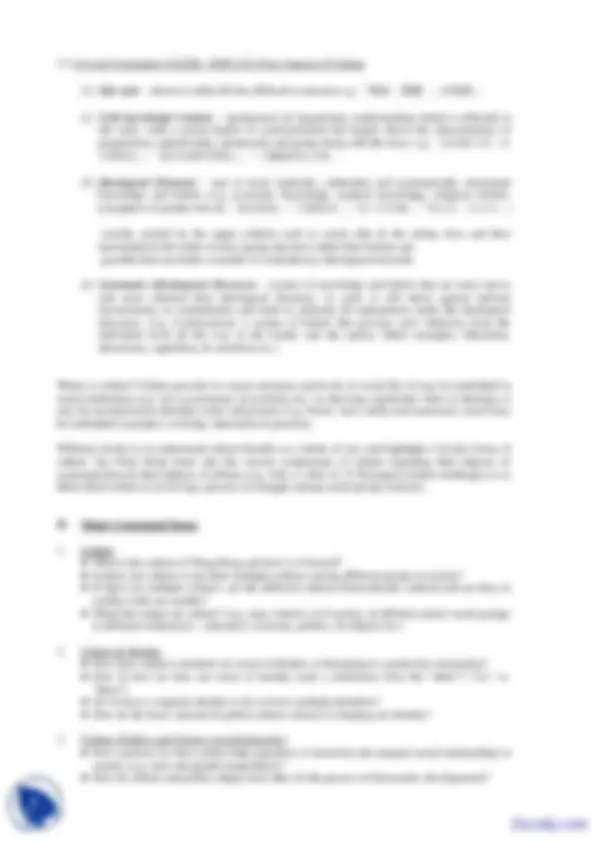



Study with the several resources on Docsity

Earn points by helping other students or get them with a premium plan


Prepare for your exams
Study with the several resources on Docsity

Earn points to download
Earn points by helping other students or get them with a premium plan
Community
Ask the community for help and clear up your study doubts
Discover the best universities in your country according to Docsity users
Free resources
Download our free guides on studying techniques, anxiety management strategies, and thesis advice from Docsity tutors
The development of hong kong identity before and after the 1950s, focusing on the role of culture in shaping a sense of belonging. It discusses various aspects of culture, including its relationship to identity and the struggle between different ways of life. The document also touches upon the major conceptual issues surrounding culture, identity, and politics in hong kong society.
Typology: Study notes
1 / 2

This page cannot be seen from the preview
Don't miss anything!


Before the 1950s, little sense of a HK identity:
No border control between HK and the mainland, hence freedom of movement among Chinese;
Nature of the population (demography): mostly people coming from the mainland for work or business with little intention of settling down in HK
Identity: Chinese, whose homeland remained on the mainland; for those residing in HK, they saw themselves as sojourners
The Sense of HK Identity by the 1990s - Examples
“HK is a “way of life”, and my sense of belonging comes from being a part of that “way of life”, taking part in the hard work that has made HK a world success today, benefiting from the fast improving quality of life all around, in short, being immersed in the radiating energy in the Hong Kong “way of life … Students returning from summer trips to China exclaimed how they felt they were culturally different from people in China, and how suddenly they came to feel HK deep down.” (Lo, in #4, pp.167-68)
I. Culture & Identity (Collective Identity)
What do you identify yourself with? (e.g. HK, China, Britain, humanity, or none of these?) Who are HK people? (“us” versus “them”/ “other” 他者 distinction)
What are HK people? ←→ CULTURE How is culture/ identity formed?
How does culture constitute our sense of identity as belonging to the HK community? Or, How do we (or different people) draw on culture to construct our (their) HK identity/ identities?
1.1 A Narrow Conception of Culture: -culture as civilization, & as high art & intellectual work (e.g. concert halls, galleries & libraries)
1.2 Raymond Williams (1961): Culture as a Way of Life Culture as “a whole way of life” of a people, as “structure of feeling” in a period; 3 levels of culture: (a) lived culture (of a particular time and place) (b) recorded culture (the culture of a period) – e.g. arts, novels, & newspapers; (c) selective tradition – A period is recorded, which is absorbed into a selective tradition.
E. P. Thompson’s criticisms (1978): culture as a struggle between ways of life (especially among different social classes)
1.3 A Local Conception [吳俊雄 (2002) #1]: Four Aspects of Culture
(1) Life style – shown in daily life but difficult to measure e.g.「搏殺、機靈 …走精面」
(2) Folk knowledge/ wisdom – spontaneous & fragmentary understanding which is reflected in life style; with a certain degree of systematization but largely shows the characteristics of pragmatism, superficiality, spontaneity and going along with the mass: e.g.「在家靠父母、出 外靠朋友」、「鬼叫你窮呀頂硬上」、「大難臨頭各自飛」
(3) Ideological Elements – sets of more explicitly, coherently and systematically articulated knowledge and beliefs (e.g. economic knowledge, medical knowledge, religious beliefs, conception of gender role etc.「趁低吸納」、「均衡飲食」、「好人有好報」、「男主外、女主內」)
-usually created by the upper echelon such as social elite & the ruling class and then transmitted to the wider society (going top down rather than bottom up) -possible that one holds a number of contradictory ideological elements
(4) Systematic (Ideological) Discourse – system of knowledge and beliefs that are more macro and more coherent than ideological elements. As such, it will check against internal inconsistency or contradiction and tends to subsume all explanations under the ideological discourse. (e.g. Confucianism: a system of beliefs that governs one’s behavior from the individual level all the way to the family and the nation; Other examples: liberalism, democracy, capitalism, & socialism etc.)
Where is culture? Culture prevails in various domains and levels of social life. It may be embedded in social institutions (e.g. law, government, & economy etc.) as showing a particular value or ideology; it may be recorded down through words and pictures (e.g. books, mass media and museums); and it may be embedded in people’s everyday interaction & practices.
Williams invites us to understand culture broadly as a whole of way and highlights 3 levels/ forms of culture. Ng Chun Hung looks into the various components of culture regarding their degrees of systematization & their spheres of affinity (e.g. folk vs. elite). E. P. Thompson further challenges us to think about culture as involving a process of struggle among social groups (classes).
II. Major Conceptual Issues